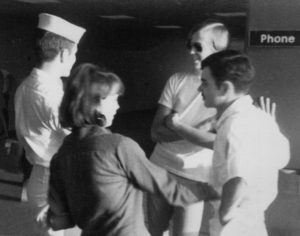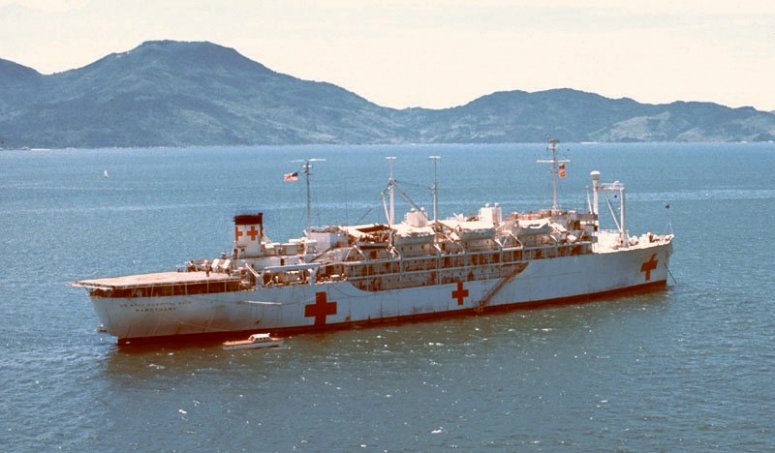Published in the 2019 edition of Ageless Authors Anthology. This memoir is all about transit; from civilian to sailor, from teenager to man, and from voiceless cog to celebrant of attainable freedom.
Photograph of the U.S.S. Sanctuary off the coast of Da Nang, 1969, by William P Jones, MD.
Half asleep and half just-couldn’t-care, the petty officer never looked up while calling roster. It didn’t matter; he didn’t know any of the young sailors standing in front of him or feel their eager apprehension as they awaited the next step in their naval adventure. My best friend from high school and I were part of that group. Front row, far left.
This petty officer in charge and all those like him we would see over the next two weeks rose to this lofty position by just happening to be the ranking non-com in the transit barracks that day, and not yet having found a way to weasel out of it. Stumbling alphabetically through the list of names handed to him five minutes earlier, he elicited feeble “here’s” and “yo’s” from young men presumed to have a legal right to the just mentioned surname.
My friend Barry’s last name ended in the letter B. He responded “here” with a little more enthusiasm than the guys who had arrived before us and already felt worn down by boredom.
The petty officer was up to the effs.
“Ferguson?” he asked.
“It’s pronounced Fair-guson!” came the reply.
“Oh, Fair-guson, then.”
“Here!”
“Fair-guson?” I thought, leaning back and looking out the corners of my eyes to see who came up with that one. I instantly pegged the hospital corpsman who flashed a guilty grin when he saw my smirk. In the near-tropical San Diego sunlight, the spherical features of his face looked like black bubbles. Still smiling, I shook my head a little in playful rebuke. Trying to stifle a laugh made his round, steel-rimmed glasses bob on the bubbles.

Barry, Ferguson and I were among a barracks full of Navy enlisted men newly graduated from boot camp or a technical school. We were in various stages of awaiting orders to our first duty station, each of us floating in limbo for a couple of weeks.
Every day, a stocky, blond yeoman would bring a few large manila envelopes to the petty officer calling the roll, who would hand out the orders. The envelope, once delivered, usually elicited a quizzical frown of apprehension from the recipient, not recognizing the base, ship or unit that was his destiny. For the next week, the recipient would wander ant-like through a maze of buildings, each long, dull day erratically punctuated with instructions and inoculations appropriate to the destination.
A couple of days later, a new petty officer in transit was assigned to take the roll at morning muster.
“Ferguson?” he asked.
“It’s pronounced Fah-guson, Sah!”
A few snickers erupted from the ranks as the corpsman executed a snappy British Army salute.
The petty officer didn’t look up. “Uh, O.K. Fah-guson?”
“Present, Sah!”
One thing I knew: Ferguson was on to something. All of us lined up at morning muster had signed away our lives. No exaggeration. The Navy now owned us physically, and even mentally. Spiritually, however, we were free to be who we were.
Actually, at our young ages, we were free to be who we were becoming. This made serving in the military an important rite of passage. Growing up, we each lived inside the frame of our history with family, neighbors, and classmates. But because we could enter the military world without that history, we were free to remake ourselves. Or be remade. I believed that Ferguson’s name game not only allowed him to attain a specific freedom in a regimented environment, it was also his process of discovering who he was and would be, as a man.
The laughs were good, too.
A day or two later we answered roll call from yet another new petty officer.
“Ferguson?”
“It’s Fer-GOOSE-n, man!” the corpsman said in an intimidating basso.
Barry and I grinned at each other.
“Ah,” the P.O. responded, “You here?”
“Yo, man!”
The following day, the stocky yeoman delivered a fresh stack of anticipated yet dreaded manilla envelopes.
“Fer-GOOSE-n!” said the same petty officer.
“Yo!” Ferguson barked.
“Your orders.”
“Yo-no!” he whimpered.
After muster, we stood back from our new friend as he scanned the contents of the envelope. A searing moment of silence. Then he smiled, and we closed in for a look. His orders were to the U.S.S. Sanctuary, a hospital ship he would join off the coast of Vietnam. It could have been much worse.
Soon, I received orders to a squadron based in Japan to train for an assignment at Da Nang Airbase in Vietnam. Barry’s sent him to intelligence duty on Ford Island in Pearl Harbor. After shipping out, we all got caught up in our jobs, losing touch with each other.
Almost two years later I pulled into Hong Kong Harbor aboard my second duty station, the aircraft carrier U.S.S. Ticonderoga. To my surprise, the Sanctuary was moored nearby. From a telephone on the quarterdeck, I called it up and asked for Robert Ferguson. It took a few minutes for the aide to Officer of the Deck to search the roster and make the connection to his ward.
A young man answered the phone.
“Robert?” I asked.
“Huh?” came the reply.
“I’m looking for Robert Ferguson,” I said.
”There’s no Robert here,” he answered.
I paused and thought about it for a second.
“Are you sure?” I teased.
There was now a pause on his end.
“Wait,” he replied, “You must mean Pierre.”

1 thought on “Noms de Guerre”
Comments are closed.